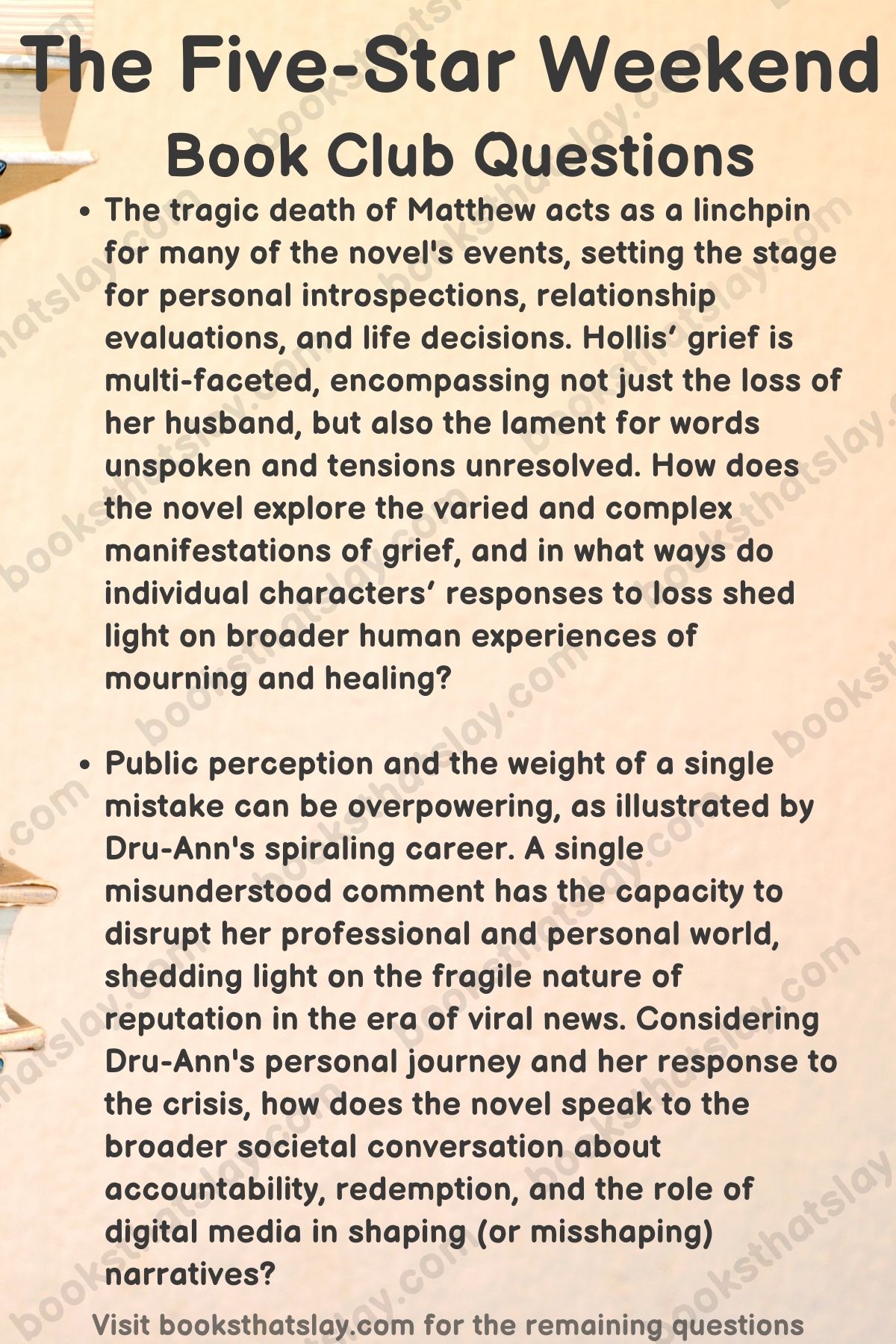18 The Five-Star Weekend Book Club Questions for Discussion
Elin Hilderbrand is a total rockstar when it comes to writing beach reads that pull you right in.
Her book, “The Five-Star Weekend,” takes us to Nantucket for a fun escape, but there’s more to it than just pretty sunsets and fancy food. Hilderbrand explores some real-life stuff too, like how social media isn’t always what it seems, how friendships can change over time, and the messy feelings we all have that don’t always fit perfectly on Instagram.
These book club questions below will get you thinking about all this good stuff along with your fellow bibliophiles.
Let’s check them out.

The Five-Star Weekend Book Club Questions
- Hollis and Caroline have a complex relationship shaped by grief and Hollis’s devotion to her career. Did you find Caroline’s initial resentment of her mother justified, considering Hollis’s actions after Matthew’s death? How does witnessing the weekend events, and hearing her mother’s friends’ stories, shift Caroline’s understanding of Hollis?
- The central theme of forgiveness runs through the book. Consider Hollis forgiving Gigi, or Dru-Ann and Tatum reconciling; were these acts of forgiveness believable, earned, or too easily granted? Did any of the characters’ decisions regarding forgiveness surprise you, and if so, why?
- Caroline’s artistic ambition puts her at odds with her mother’s expectations for the weekend’s footage. Isaac encourages Caroline to seek conflict beneath the luxurious surface. Do you agree with his approach to documentary filmmaking, or do you think Caroline could have found depth and meaning without actively instigating drama?
- Dru-Ann’s career and reputation are threatened by a viral social media attack. This raises questions about cancel culture and how online judgment compares to forgiveness in real life. Did you find the resolution to Dru-Ann’s public relations crisis realistic? Should celebrities and public figures face harsher consequences for their mistakes in the social media era?
- Hollis’s group of friends represents different stages of her life, showcasing the evolution of friendship. Do you feel Hollis chose the best confidantes for this emotionally charged weekend, or would other friends have been more supportive? Which friendship dynamics in the novel resonated the most with you, and why?
- Hollis throws this lavish weekend as a distraction from her grief over Matthew. Is it healthy to try and bury sorrow with extravagance and distraction? Were there times when you felt Hollis should have been more open about her pain, or is her approach understandable?
- The novel touches on female ambition through Hollis, Dru-Ann, and even Caroline. Do you find their ambition portrayed positively, or does it come across as selfish at times? Does ambition clash with their personal lives, and does the book offer any insights into the challenges ambitious women face?
- Many characters harbor secrets – Gigi’s affair, Brooke’s sexuality, even Hollis’s lingering feelings for Jack. Did the timing of these revelations feel realistic or overly dramatic? Do you believe Hollis and Jack truly have a second chance, or are their past issues likely to resurface?
- The weekend is designed for Instagrammable perfection, yet conflict lingers beneath the surface. How does the book explore the disconnect between curated appearances and the messiness of real life? Do any of the characters undergo shifts in this perception?
- Nantucket plays a significant role as the backdrop for the novel. Does the setting, with its connotations of wealth and privilege, enhance the story? Could the themes of the book have worked in a less affluent or exclusive location?
- Hollis achieves success through her food blog but finds herself disconnected from relationships she values, even her daughter’s. Brooke, on the other hand, sacrifices her desires to fulfill societal expectations. Could either woman have found a balance between pursuing their goals and nurturing their personal lives? Does one character’s path resonate more than the other?
- Hollis’s forgiveness of Gigi, after discovering her affair, is a major turning point. Does the novel justify this forgiveness, or is Gigi’s betrayal too severe? In contrast, is Caroline’s initial resentment of Hollis understandable, and does their reconciliation feel earned?
- While Hollis and Caroline struggle, Brooke seeks to replicate Hollis’s seemingly perfect motherhood from years prior. Did Brooke misinterpret Hollis’s experience as a mother, or did Hollis project a false image of idealized motherhood? How do both women’s concepts of motherhood evolve by the novel’s end?
- Tatum embraces her Nantucket identity, while Dru-Ann embodies strength and ambition. Do their character arcs represent a clash of values, or is there room in the novel for both perspectives? Was either woman’s personal growth more transformative or satisfying, and why?
- Gigi’s actions drive much of the conflict, but she offers support to Hollis during her grief. Is Gigi’s character ultimately a force of destruction, a catalyst for change, or something more nuanced? Could the novel have worked without her as a central figure, or does her deceptive presence add an essential layer to the narrative?
- The weekend reveals how the women’s friendships empower them to make brave choices and discoveries about themselves. How does the support system among Hollis, Tatum, Dru-Ann, Brooke, and even Gigi encourage them to confront personal issues and grow? Do you think they would have reached the same level of self-awareness without the dynamic of this specific group of women?
- The novel highlights the contrast between the curated image Hollis projects on social media versus her inner struggles. Do you find this contrast a relatable commentary on modern life, and how does this tension impact Hollis’s journey? Would the story’s themes be different if social media were not a factor?
- Caroline and Hollis have a complicated relationship, shaped by grief and competing priorities. How does Caroline’s evolving perspective on her mother, driven by the conversations with other women, change her own stance on responsibility, ambition, and womanhood? Does this shift feel authentic within the mother-daughter dynamic?
Check out our discussion questions for other books: